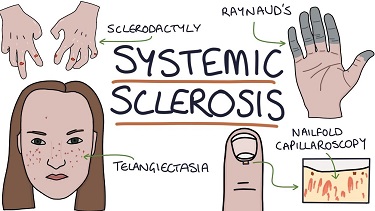South Korean Study Finds That SARS-CoV-2 Spike Protein Accelerates Systemic Sclerosis By Increasing Inflammatory Cytokines, Th17 Cells, And Fibrosis
Thailand Medical News Team Aug 11, 2023 1 year, 8 months, 1 week, 2 days, 16 hours, 20 minutes ago
COVID-19 News: The ongoing global COVID-19 pandemic caused by the severe acute respiratory syndrome coronavirus 2 (SARS-CoV-2) has wreaked havoc on healthcare systems, economies, and societies worldwide. While primarily targeting the respiratory tract and inducing lung complications such as pneumonia, COVID-19 has also been associated with an array of immune responses, inflammation, autoantibody production, and coagulation issues that mirror those seen in autoimmune diseases, including systemic sclerosis (SSc).This has been extensively covered in past studies and
COVID-19 News reports.

Understanding the interactions between COVID-19 and autoimmune diseases is crucial, especially considering the susceptibility of individuals with autoimmune disorders to severe manifestations of the virus due to their compromised immune systems. One autoimmune condition that warrants investigation is systemic sclerosis, a complex connective tissue disorder marked by extensive fibrosis, vasculopathy, and immune dysfunction affecting both skin and internal organs.
The Catholic University of Korea conducted a study to unravel the potential links between SARS-CoV-2 and the development and progression of systemic sclerosis. The study, based on laboratory experiments and a murine model, delved into the effects of the SARS-CoV-2 spike protein, a prominent component of the virus responsible for its binding to host cells.
Investigating the Impact
The study team first examined the influence of the SARS-CoV-2 spike protein on human embryonic kidney 293 (HEK293) cells. They discovered that when the spike protein gene was introduced into these cells, fibrosis-related proteins showed heightened expression levels. This intriguing finding hinted at the potential of the spike protein to trigger fibrosis-inducing processes.
Moving from cell cultures to a living organism, the study employed a murine model of systemic sclerosis induced by bleomycin (BLM). Mice were injected with the gene encoding the SARS-CoV-2 spike protein and the ACE2 receptor, a protein on the surface of host cells that the virus uses to gain entry. The results were noteworthy: the skin thickness of mice with systemic sclerosis increased when exposed to the SARS-CoV-2 spike protein. This phenomenon mirrored the fibrosis commonly observed in SSc patients.
Unveiling the Mechanisms
The study didn't stop at observing physical changes; it delved into the underlying mechanisms that connect SARS-CoV-2 and systemic sclerosis. The spike protein injection led to an upsurge in the levels of autoantibodies and thrombotic factors like anti-phospholipid antibodies (APLA). Additionally, there was a significant increase in the proinflammatory cytokine IL-17, both in the skin and various organs like the lungs, spleen, and blood.
This inflammatory milieu was not limited to cytokines alone; it extended to the immune cells. The study revealed a rise in Th2 and Th17 cells, which are implicated in autoimmune responses, inflammation, and fibrosis. Both types of T cells are notorious for their role in promoting fibrosis, contributing to the excessive tissue accumulation characteristic of systemic sclerosis.
>
Implications and Future Directions
These findings hold potential implications for understanding the impact of COVID-19 on individuals with systemic sclerosis and potentially other autoimmune diseases. By intensifying fibrosis through heightened inflammation, autoantibody production, and thrombosis, the SARS-CoV-2 spike protein could exacerbate disease progression.
However, this study is just the tip of the iceberg. While it sheds light on the potential connections, further research is warranted. The intricate interactions between immune cells and fibroblasts, the cells responsible for collagen production, require in-depth exploration.
Investigating whether the spike protein directly influences the differentiation of T cells into Th2 and Th17 cells could provide crucial insights into the underlying mechanisms.
In the broader context, understanding these mechanisms could pave the way for novel therapeutic approaches. Targeting the pathways responsible for the fibrotic response and immune dysregulation might provide opportunities to mitigate the impact of COVID-19 on patients with systemic sclerosis.
Conclusion
The study conducted by The Catholic University of Korea reveals intriguing connections between the SARS-CoV-2 spike protein and the development of systemic sclerosis. By accentuating fibrosis-inducing pathways and amplifying inflammatory responses, the spike protein could potentially accelerate disease progression in SSc patients. This research underscores the importance of unraveling the intricate relationships between viral infections, autoimmune diseases, and the immune system's responses, offering potential avenues for future therapeutic interventions and a deeper understanding of the complex interplay between viruses and autoimmune disorders.
The study findings were published on a preprint server and are currently being peer reviewed for publication into the Journal of Inflammation (BMC).
https://www.researchsquare.com/article/rs-3186875/v1
For the latest
COVID-19 News, keep on logging to Thailand Medical News.
